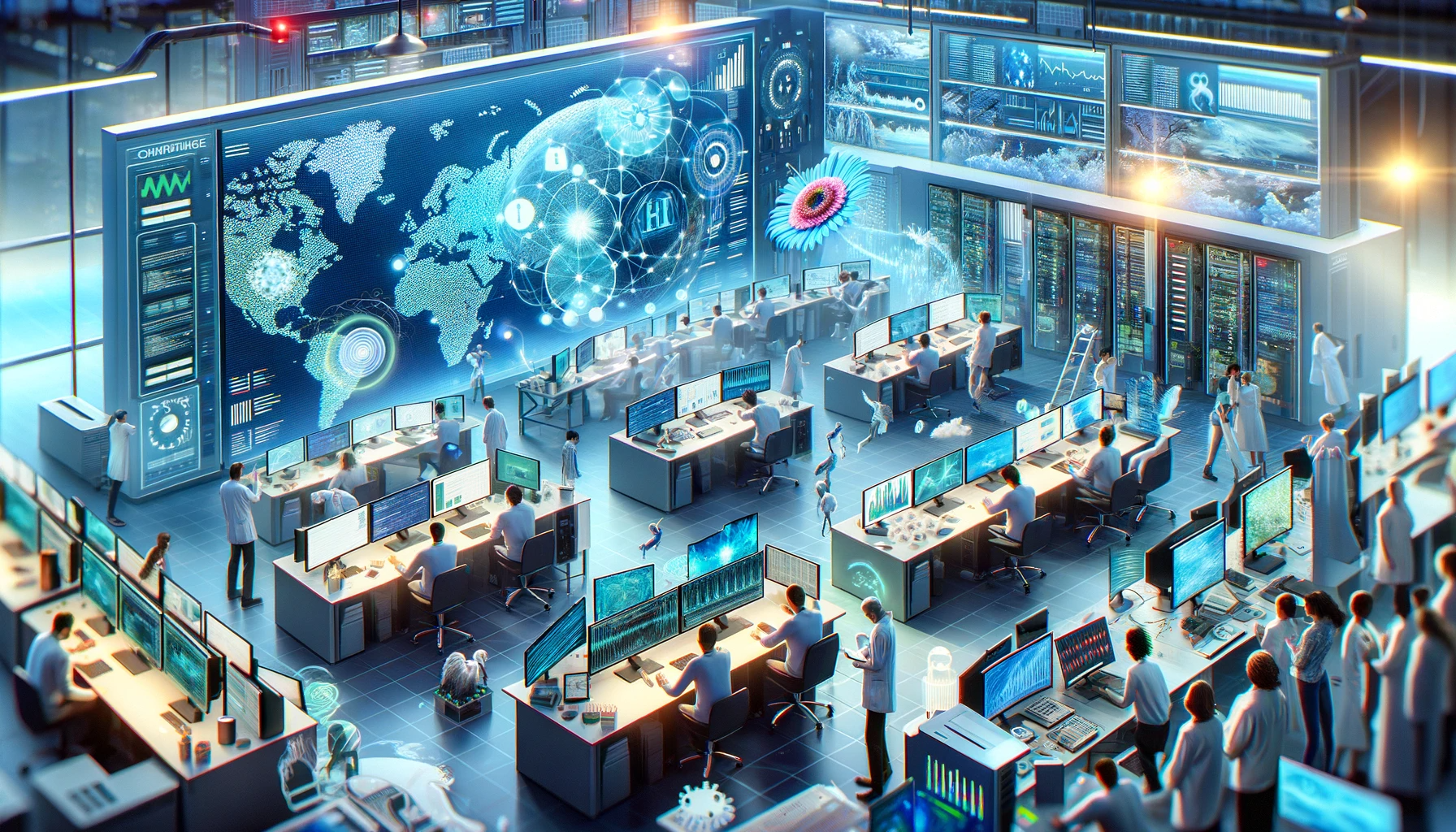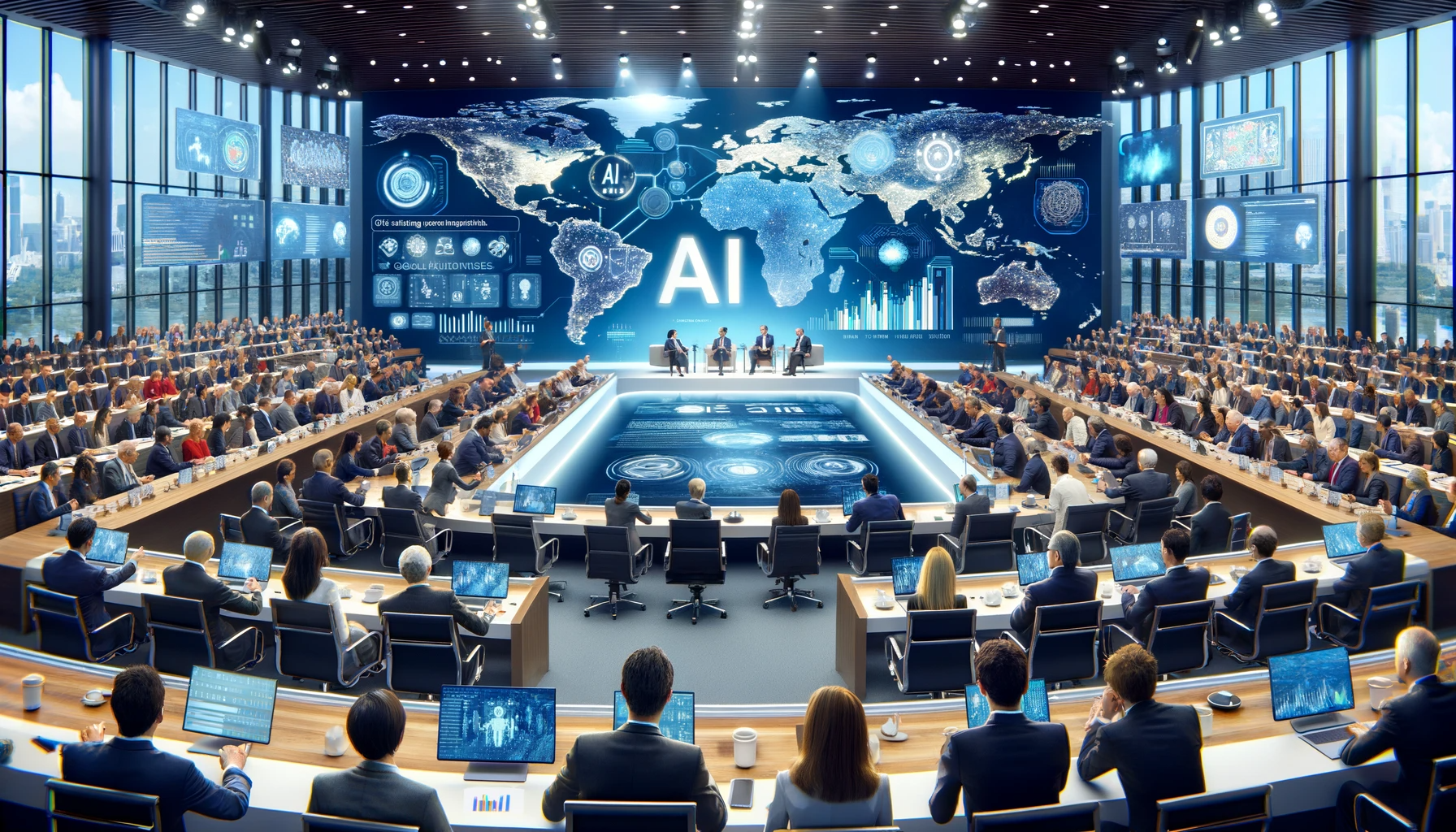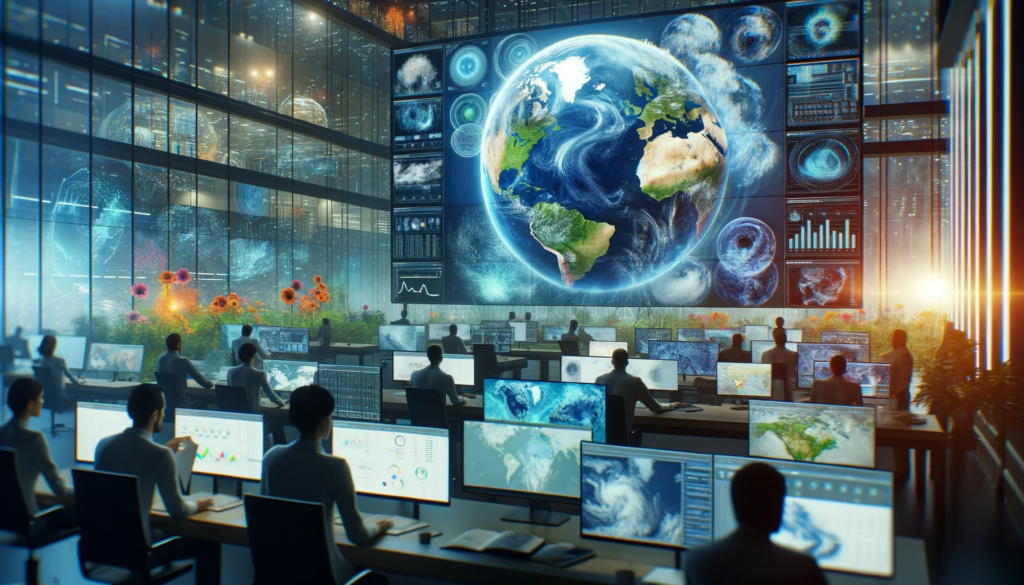AI, once confined to the realms of science fiction, has emerged as a transformative force with far-reaching implications for society. Its rapid advancement has positioned it as a critical tool in addressing some of the most daunting challenges humanity faces today. In an era marked by environmental concerns, healthcare crises, and persistent hunger, the question that looms large is whether AI can be harnessed to offer innovative solutions to these complex global issues.
The impact of AI extends across various facets of our lives, from smart devices that understand and respond to our voices to complex algorithms that power recommendation systems. As AI’s capabilities continue to evolve, there is a growing recognition of its potential to confront the major global challenges of our time. Climate change, with its devastating effects on the planet, demands innovative approaches to mitigation and adaptation. Healthcare crises, as exemplified by recent pandemics, necessitate swift and effective responses. The enduring issue of hunger requires sustainable solutions that can ensure food security for all.
This article embarks on a journey to explore the profound intersection of AI and these major global challenges. We will delve into the ways in which AI technologies are being leveraged to address climate change, combat healthcare crises, and alleviate hunger. With each step, we will scrutinize the ethical and societal implications, recognizing that while AI offers immense promise, it also poses complex questions about responsibility, equity, and transparency. As we navigate this landscape, we ask the central question: Can AI technologies truly contribute to meaningful solutions for these pressing global issues? Join us on this exploration of AI’s potential to shape a better future for our world.

The Power of AI in Problem-Solving
In recent years, artificial intelligence (AI) has emerged as a game-changer in addressing complex global challenges. AI’s capabilities in data processing, pattern recognition, and predictive analytics have positioned it as a formidable tool in problem-solving. Advancements in machine learning and deep learning algorithms have given AI the ability to analyze vast datasets and extract valuable insights.
One of the key strengths of AI is its capacity to uncover hidden patterns and trends within data that may not be apparent to human observers. This attribute is particularly valuable when tackling major global challenges that involve multifaceted and interconnected variables. Whether it’s in climate science, healthcare, or other domains, AI’s prowess in understanding complex systems is reshaping our approach to problem-solving.
AI and Climate Change
The impact of climate change on our planet is undeniable, and addressing this global challenge demands innovative solutions. AI is playing a pivotal role in climate science and environmental monitoring. It assists in climate modeling, enabling scientists to simulate and analyze various scenarios to better understand climate patterns and predict future changes.
AI is also instrumental in predicting extreme weather events, which have become increasingly frequent and severe due to climate change. Machine learning algorithms can analyze historical weather data and satellite imagery to provide early warnings and improve disaster preparedness.
Furthermore, AI contributes to mitigating environmental impact by optimizing resource usage. For instance, in agriculture, AI-powered precision farming techniques help reduce water consumption and improve crop yields. In renewable energy, AI algorithms optimize the efficiency of solar and wind power generation.
Several initiatives are harnessing AI to combat climate change. These include projects focused on carbon capture and sequestration, smart grid management, and sustainable urban planning. AI-driven solutions have the potential to revolutionize our approach to environmental challenges and contribute to a more sustainable future.
AI in Healthcare Crises
The healthcare sector faces crises of various magnitudes, from global pandemics to regional health emergencies. AI has proven its mettle in these critical situations by offering innovative solutions that enhance diagnostics, drug discovery, and vaccine development.
In diagnostics, AI-powered systems can analyze medical images, such as X-rays and MRIs, with remarkable accuracy. This capability is particularly valuable in detecting diseases like cancer at an early stage, improving patient outcomes. During pandemics, AI plays a crucial role in analyzing epidemiological data to track the spread of diseases and predict outbreak hotspots.
AI is also transforming drug discovery by significantly speeding up the process. Machine learning models can analyze vast databases of chemical compounds and predict potential drug candidates with therapeutic properties. This accelerates the development of treatments for emerging diseases.
Additionally, AI-driven vaccine development platforms enable researchers to design vaccines more rapidly. During the COVID-19 pandemic, for example, AI was used to identify potential vaccine candidates and optimize their effectiveness.
Real-world examples abound, showcasing how AI has made a difference in healthcare crises. These instances underscore the potential of AI to revolutionize healthcare and provide swift responses to urgent medical challenges.

AI’s Contribution to Food Security
Food security is a fundamental global challenge, and AI is playing a crucial role in addressing it. AI-powered solutions in agriculture are helping to combat hunger and improve food security worldwide.
Precision agriculture, powered by AI, involves the use of sensors, drones, and machine learning algorithms to monitor and manage crops with precision. These technologies enable farmers to optimize resource use, reduce wastage, and increase crop yields. AI-driven predictive models provide valuable insights into factors affecting crop growth, including weather conditions and pest infestations.
Crop monitoring is another area where AI is making a significant impact. Satellite imagery and AI algorithms can detect early signs of crop diseases, enabling timely intervention to prevent crop loss. In regions prone to drought or water scarcity, AI-driven irrigation systems can optimize water usage, ensuring crops receive just the right amount of moisture.
AI also assists in yield optimization by analyzing historical data to identify the best crop varieties and planting times for specific regions. This knowledge helps farmers make informed decisions, leading to higher agricultural productivity.
Numerous initiatives and projects are leveraging AI to address food security challenges. For example, the “Digital Green” project uses AI-driven video content to educate farmers in rural areas, empowering them with knowledge and best practices for sustainable agriculture.
Ethical and Societal Consideration
While AI holds tremendous promise in solving global challenges, it also raises important ethical and societal considerations. One concern is bias in AI algorithms, which can perpetuate inequalities if not addressed. For instance, biased data used in AI models may lead to unfair resource allocation in agriculture or unequal access to healthcare solutions.
Transparency is another key issue. The inner workings of complex AI algorithms can be inscrutable, making it difficult to explain their decisions. This opacity can erode trust, especially when AI is used in critical domains like healthcare or public administration.
Access to AI technologies is a critical ethical consideration. Ensuring that AI benefits are equitably distributed is essential. Not all regions or communities have equal access to AI-driven solutions, potentially exacerbating global disparities.
To address these concerns, responsible AI development is imperative. Developers must prioritize fairness, transparency, and accountability when creating AI solutions for global challenges. Regulatory frameworks and guidelines can help ensure ethical AI use.
Collaboration and Partnerships
Addressing major global challenges with AI requires collaboration on a global scale. Governments, organizations, and AI developers must work together to harness AI’s potential fully.
Successful partnerships in AI and global issues abound. For example, the United Nations has initiated projects like “AI for Good,” which brings together experts, policymakers, and organizations to explore AI solutions for sustainable development goals. This collaborative effort aims to leverage AI for humanitarian and environmental benefits.
International cooperation is essential, as many global challenges transcend borders. Climate change, for instance, affects every nation and requires collective action. Governments and organizations must collaborate to develop AI-powered climate models and mitigation strategies.
Additionally, partnerships between the public and private sectors are vital. Private companies often have the resources and expertise to develop AI technologies, while governments and international organizations can ensure these technologies are used for the greater good.
In conclusion, AI’s potential to address major global challenges is significant, but it comes with ethical responsibilities and the need for cooperation. The future of solving issues like hunger, healthcare crises, and climate change may depend on how effectively we harness AI technologies and collaborate across borders and sectors.
Future Prospects
The future of AI’s role in addressing major global challenges is filled with promise and potential. As AI technology continues to advance, its applications in solving issues like climate change, healthcare crises, and global hunger are expected to expand significantly.
One of the most exciting prospects is the advancement of AI algorithms and models. Machine learning and deep learning techniques are continuously evolving, leading to more accurate and efficient AI solutions. In the context of climate change, AI-powered climate models will become even more sophisticated, offering more precise predictions and actionable insights for mitigation and adaptation strategies.
In healthcare, AI is likely to play an increasingly critical role in drug discovery and personalized medicine. AI algorithms will continue to analyze vast datasets to identify novel treatments and optimize existing ones. Moreover, AI-driven diagnostics will become more accessible, enabling early disease detection and prevention on a global scale.
For food security, AI-powered precision agriculture will become even more integral to sustainable farming practices. As AI models gain access to more data and insights, farmers will have better tools for optimizing crop production and resource usage. This will contribute to increased yields and reduced food wastage.
In the ethical and societal realm, the future holds the potential for AI algorithms that are more transparent and fair. Research into mitigating bias in AI will continue to advance, ensuring that AI-driven solutions are equitable and just.
AI’s role in addressing major global challenges is poised to grow in significance as technology advances. It offers innovative solutions and the potential to make a positive impact on pressing issues that affect humanity. However, this potential must be harnessed responsibly, with a focus on fairness, transparency, and cooperation. The future of AI in tackling global challenges is both exciting and challenging, but it holds the promise of a better, more sustainable world.

Conclusion
In this article, we have explored the potential of AI in addressing major global challenges such as climate change, healthcare crises, and global hunger. AI’s power lies in its ability to process vast amounts of data, recognize patterns, and provide actionable insights, making it a valuable tool in the quest to find solutions to these pressing issues.
We have discussed how AI is already being applied in various domains, from climate modeling and disease diagnostics to precision agriculture. These applications showcase AI’s potential to contribute significantly to solving some of the world’s most complex problems.
However, we have also acknowledged the ethical and societal considerations that come with the use of AI in such critical areas. Bias, transparency, and equitable access are vital concerns that must be addressed to ensure that AI-driven solutions benefit all of humanity.
As we look to the future, the prospects for AI’s role in tackling global challenges are bright. Advances in AI technology, collaborations among governments, organizations, and developers, and a commitment to responsible AI development all point to a future where AI plays a pivotal role in creating a better world.
The integration of AI in addressing these challenges will require continuous efforts, but the potential rewards are immense. AI has the capacity to revolutionize our approach to global issues and lead us toward a more sustainable, healthy, and equitable future.
